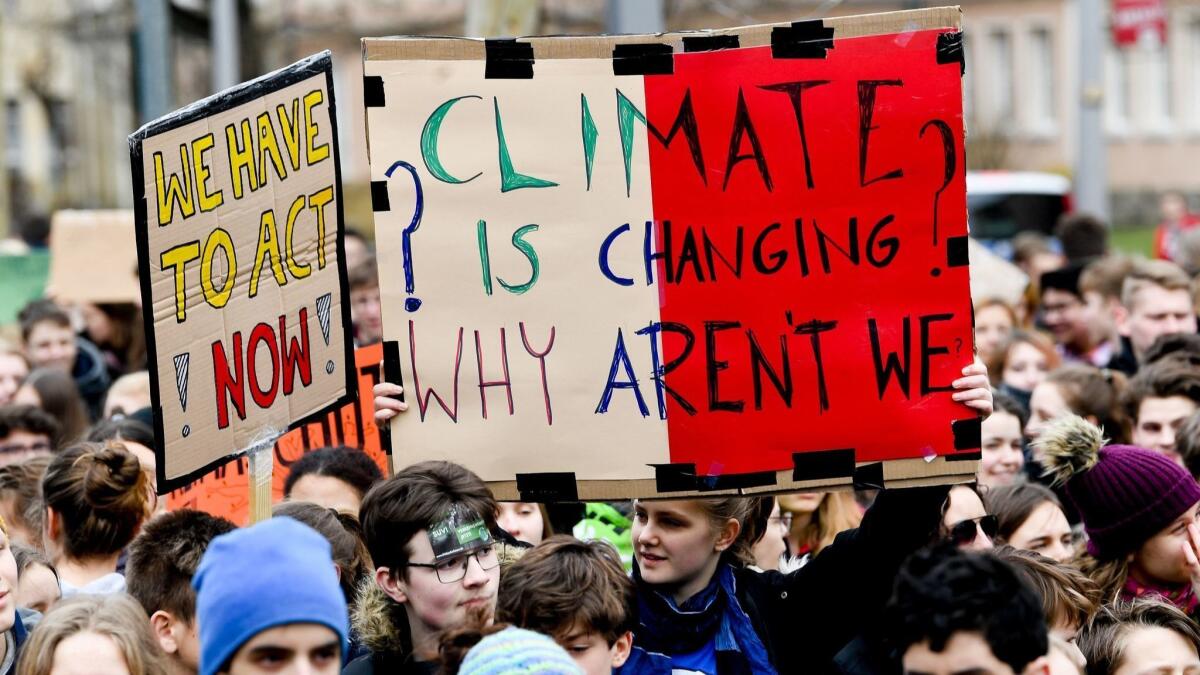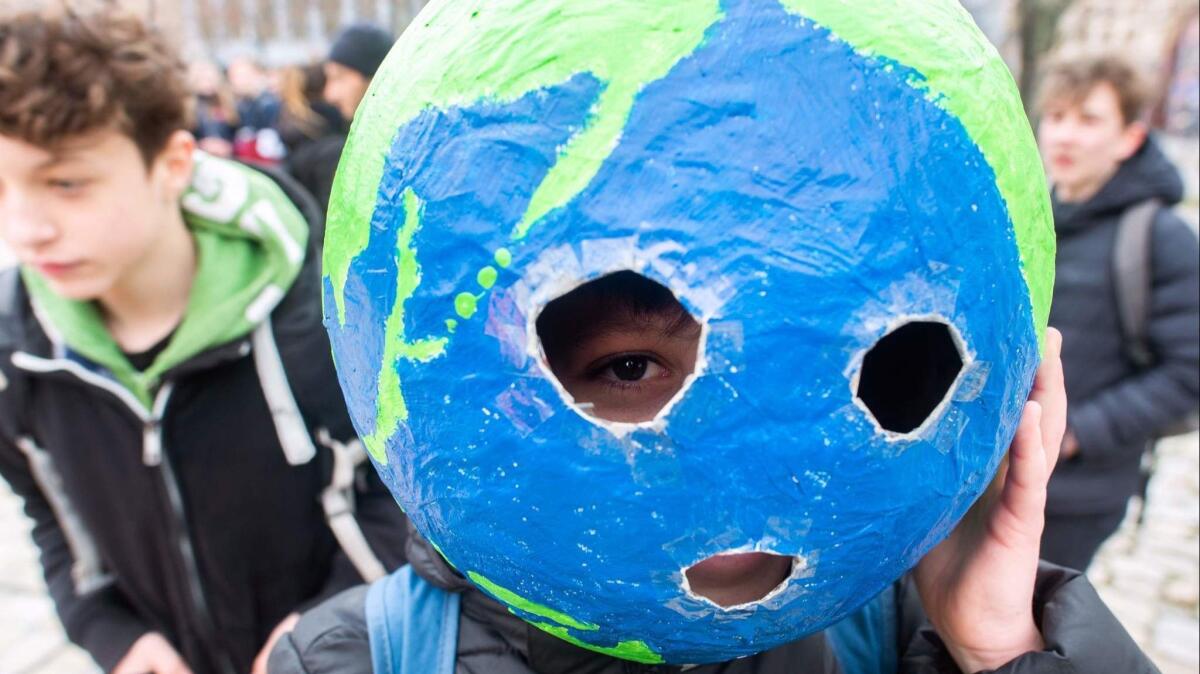If it’s Friday, here’s what young climate change activists worldwide are up to

Reporting from Berlin — Luisa Neubauer puts it simply: A rapidly growing student movement to stand up against damage connected to climate change is a direct result of the failure by older generations to protect the future, so time’s up.
Neubauer, a 22-year-old geology student in Goettingen, is the chief organizer of protests in Germany, and among the hordes of students in many countries holding weekly demonstrations each Friday to pressure government officials and businesses to do more to curtail harmful greenhouse gas emissions.
“It’s the right time and the right place,” she said in an interview. “We’ve found a way to express our anger and frustration about the way people in charge now are threatening our future.”
Similarly, young protesters involved with the Fridays For Future movement have touched nerves in other countries across Europe, Asia, Africa, Australia and the Americas with their demonstrations — standing up and boldly taking on leading politicians, industrialists and assorted naysayers.
The #FridaysForFuture website said 1.6 million students were taking part in demonstrations on March 15 at more than 2,000 locations in 125 countries.
The demonstrations that caught on in Germany originated in Sweden in August with then-15-year-old Greta Thunberg, a climate activist who has been staging school strikes on Fridays in front of the parliament building in Stockholm. Thunberg, who is now 16 and expected to attend Friday’s rally in Berlin, has emerged as a global poster child for the movement with a brief but powerful speech in December bluntly shaming climate negotiators at a United Nations conference in Katowice, Poland.
“You say you love your children above all else and yet you are stealing their future in front of their very eyes,” Thunberg said. “Until you start focusing on what needs to be done instead of what is politically possible, there is no hope. We cannot solve the crisis without treating it as a crisis.”
Media coverage in Germany has been intense in recent weeks and the demonstrations have been the subject of lively prime-time TV talk shows.
Fed up with what they call insufficient efforts and broken promises to slow a rise in global temperatures, more than 300,000 students in Germany are expected to skip school Friday to protest against the failures of their government and parents’ generations to do more to fight climate change. Marches and rallies are expected in about 170 towns and cities across Germany.
More than 25,000 grade school, high school and college students defiantly skipped school last week to participate in a Berlin rally, and loud gatherings of about 10,000 people each were reported in many other cities, such as Hamburg and Cologne.
Some carried posters with such slogans as, “Report card: Climate protection F, Ethics F, Responsibility F,” “Protect the climate and not the coal industry,” “We’re running out of time and you’re asleep at the wheel.”
“It is all a bit overwhelming,” Neubauer said. “We started with 200 people in Berlin in December and all of a sudden we have a whole movement.”

The primary goal of the school strike protests, she said, is to spur more meaningful action from elected leaders and industry against climate change.
Neubauer and other young activists trace the momentum for their cause in Germany to the release in October of a landmark report from a United Nations panel of scientists, the U.N. Intergovernmental Panel on Climate Change. It said that if greenhouse gas emissions continued unabated, the atmosphere would warm by as much as 2.7 degrees Fahrenheit above the pre-industrial averages by 2040 — worsening droughts, wildfires, sea-level rise and poverty. Global temperatures have already risen an average of about 1.8 degrees Fahrenheit above pre-industrial levels.
“It’s our future and we’re not going to stop fighting for it,” Neubauer said.
In their speeches at the rallies and in media interviews and on TV talk shows, Neubauer and others sometimes angrily say that 195 nations promised in the Paris climate accord in 2015 to strengthen the global response to climate change by keeping the rise in global temperatures below 2 degrees Celsius (3.6 degrees Fahrenheit) above pre-industrial levels.
“Our government has messed this up so much,” she said. “There are a lot of reasons that people are angry and joining us. Our goal is to get political leaders to tackle the climate crisis and make them aware of the consequences of their inaction.”
Although German Chancellor Angela Merkel and some German leaders have praised the students for their activism, others have argued that they are being naive and should be disciplined for skipping school to attend demonstrations.
“You can’t possibly expect children and teenagers to understand all the complex issues involved and how it can be dealt with sensibly and economically,” Christian Lindner, the leader of the Free Democrats, a pro-business opposition party in Parliament, and a critic of the rallies, was quoted as saying in Bild am Sonntag newspaper. “This is an issue that is better left for professionals.”
Stefan Rahmstorf, a climate scientist at the Potsdam Institute for Climate Impact Research, countered Lindner’s criticism by writing that professional scientists were on the students’ side.
“The students are out marching on the streets because politicians have failed to meet the targets despite all their pretty promises,” he wrote in a recent Twitter post.
In a TV talk show appearance with Neubauer this week, Volkswagen Chief Executive Herbert Diess said he admired the movement’s success and offered a theory on why it has caught on with such a vengeance.
“Younger people have brought a whole new quality to the climate debate because it’s their future and they have every right to blame us for the changed world they’ll be living in,” he said. “They’re right to hold us accountable and demand change.”
Klaus Hurrelmann, a professor of public health and education at the Hertie School of Governance in Berlin, said he has never seen so many high school and grade school students taking part in such a prolonged protest movement.
“The intensity of the movement is surprising. You can see and feel their passion for this issue,” Hurrelmann said. “They’re tired of getting the runaround. It feels like something was building up inside for a long time and it’s all coming out now.”
Kirschbaum is a special correspondent.
More to Read
Sign up for Essential California
The most important California stories and recommendations in your inbox every morning.
You may occasionally receive promotional content from the Los Angeles Times.










